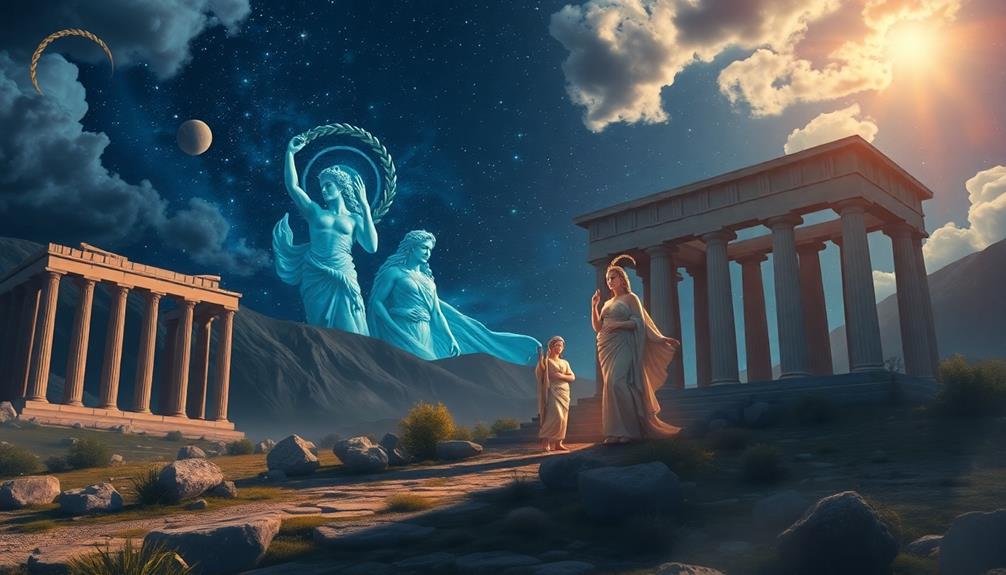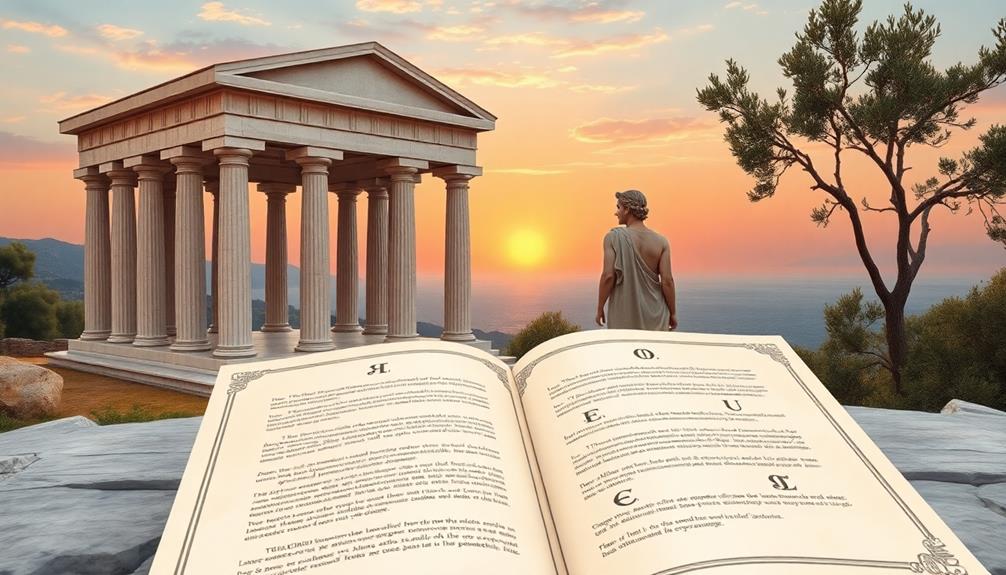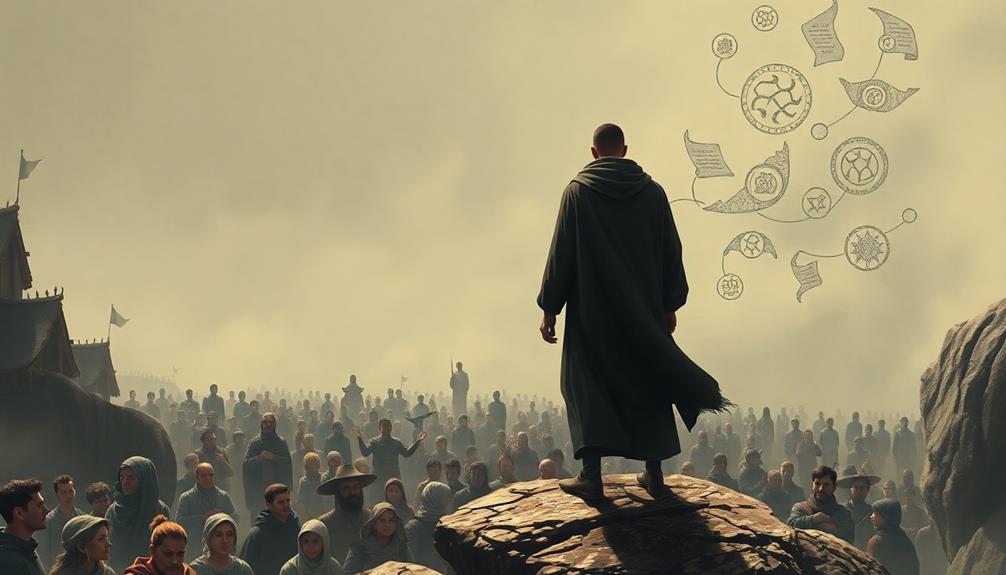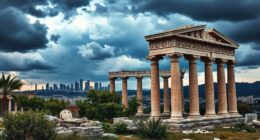Greek myths unfold rich narratives that reflect the complexities of human emotions and morality. You'll find themes of love, loss, and hope woven through stories of gods and heroes who shape their destinies. Characters like Orpheus and Eurydice highlight the fragility of trust, while Arachne's tale warns against hubris. Each myth carries a lesson, teaching virtues and the consequences of one's choices. The struggles and triumphs of these figures resonate with your own experiences, revealing deeper truths about life. To uncover even more hidden meanings, you'll want to explore the intricate connections between these ancient tales and modern life.
Key Takeaways
- Greek myths explore universal themes of love, loss, triumph, and tragedy, reflecting human emotions and experiences.
- The interactions between gods and mortals illustrate moral lessons, emphasizing virtues like humility, trust, and the dangers of hubris.
- Heroic journeys symbolize personal growth and the balance between human effort and divine influence in shaping destinies.
- Symbolism in myths, such as Pandora's Box and Icarus's Flight, conveys deeper truths about the human condition and the consequences of actions.
- Greek mythology's legacy continues to influence modern narratives, enriching contemporary themes with archetypes and moral dilemmas.

Mythology (75th Anniversary Illustrated Edition): Timeless Tales of Gods and Heroes
A good option for a Book Lover
As an affiliate, we earn on qualifying purchases.
As an affiliate, we earn on qualifying purchases.
Overview of Greek Myths
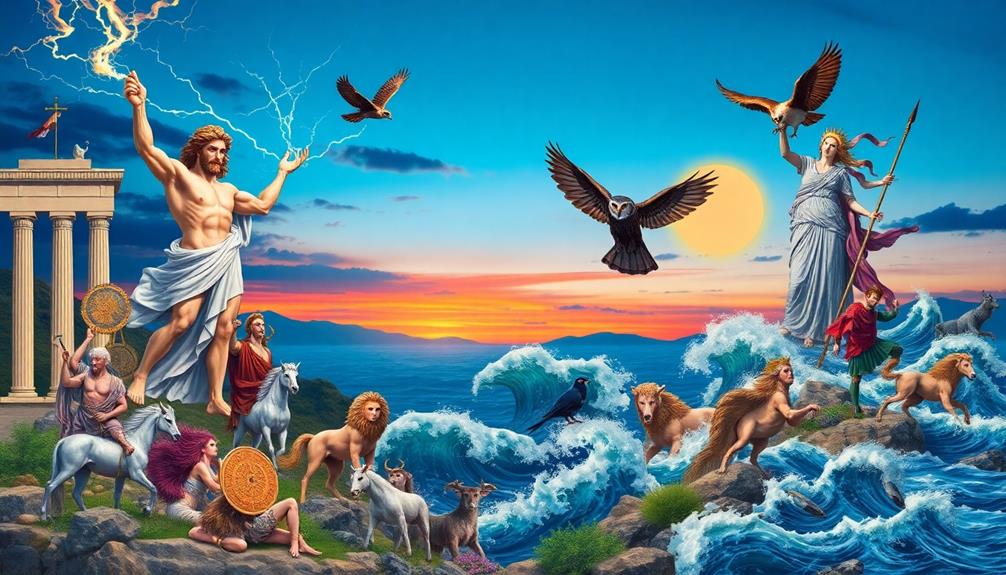
Since ancient times, Greek myths have served as essential narratives that shape the cultural and historical identity of civilization. These ancient narratives explore a range of themes, from triumph and tragedy to love and loss, reflecting the complexities of human nature.
At the heart of Greek mythology lies a rich pantheon of gods and goddesses, residing on Mount Olympus, each embodying distinct human traits and emotions. You'll find that these deities often intervene in mortal affairs, influencing relationships and events in ways that resonate deeply with our own lives.
The love stories woven through these myths, such as that of Orpheus and Eurydice, illustrate both the beauty and pain of love, providing timeless lessons about devotion and loss.
As myths evolved over generations, they changed from oral traditions during the Bronze Age to documented literary works like Homer's *Iliad* and Hesiod's *Theogony*. This transformation not only preserved the tales but also made them more accessible to contemporary audiences.

The Greek Myths. Illustrated
As an affiliate, we earn on qualifying purchases.
As an affiliate, we earn on qualifying purchases.
The Significance of Morality
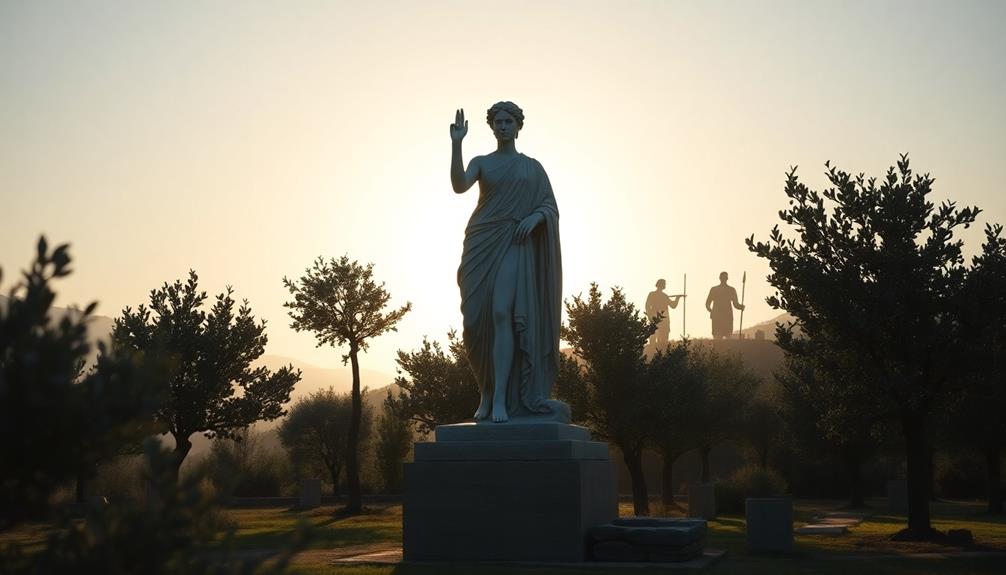
Greek myths are rich with moral lessons that resonate through time, offering insights into human behavior and ethical dilemmas. These stories highlight the importance of morality in our lives, using relatable characters and situations to illustrate key values.
Here are four significant moral lessons from Greek mythology:
- Pride: In the tale of Arachne, her arrogance leads to punishment, reminding you that humility is essential.
- Vanity: Narcissus's obsession with his own reflection teaches that excessive vanity can result in despair and even demise.
- Trust: The story of Orpheus and Eurydice emphasizes the fragility of trust in relationships—breaking it can lead to irreversible consequences.
- Promises: "Theseus and the Minotaur" underscores the importance of keeping promises; Theseus's failure to change his ship's sails results in tragedy for his father.
These myths serve as cautionary tales, revealing how your choices can shape your fate.

Greek Mythology: The Gods, Goddesses, and Heroes Handbook: From Aphrodite to Zeus, a Profile of Who's Who in Greek Mythology (World Mythology and Folklore Series)
As an affiliate, we earn on qualifying purchases.
As an affiliate, we earn on qualifying purchases.
Themes of Love and Loss

In exploring the themes of love and loss in Greek myths, you'll encounter the trials of Eros and Psyche, where love demands perseverance despite formidable challenges.
Orpheus's desperate journey into the Underworld reveals the depths of love and the heartache that comes from loss.
Then there's the heartbreak of Narcissus and Echo, illustrating how unrequited love can lead to despair and transformation.
Eros and Psyche's Trials
The love story of Eros and Psyche captivates with its portrayal of trials that test the very fabric of love. As Psyche faces three seemingly impossible tasks set by Aphrodite, you see the depths of her commitment to Eros. These challenges reveal essential themes about love and perseverance:
- Perseverance: Psyche's determination to reunite with Eros showcases how love often demands resilience.
- Trust: Despite the obstacles and doubts, Psyche learns to trust Eros and herself.
- Inner Beauty: Psyche's character growth emphasizes that true beauty comes from within, transcending physical appearances.
- Transformation: Eros, as the god of love, symbolizes how love can change and uplift us.
Through these trials, Psyche embodies the human experience of longing and the pursuit of acceptance. The myth illustrates that true love triumphs over adversity, culminating in Psyche's ascension to immortality.
Ultimately, Eros and Psyche's union signifies not just a personal victory, but the eternal nature of true love. Their journey reminds you that love, while often fraught with challenges, can lead to profound transformation and fulfillment.
Orpheus's Desperate Journey
Love's trials take on a haunting quality in the tale of Orpheus, whose desperate journey to reclaim Eurydice showcases the profound depths of grief and longing.
After losing his beloved wife to a snake bite, Orpheus, a legendary musician, ventures into the Underworld, driven by an unwavering love. Hades and Persephone agree to let Eurydice return to the living, but they impose a critical condition: Orpheus mustn't look back at her until they reach the surface.
As you follow Orpheus through this dark domain, you feel the weight of his trust and the fragility of love. Despite his deep devotion, doubt creeps in. Just before exiting the Underworld, the temptation to glance back becomes overwhelming. In that fleeting moment, he succumbs, and Eurydice vanishes forever, lost to him because of a moment's hesitation.
This heartbreaking tale underscores the universal human experience of grief. Orpheus's journey reflects the struggle to reclaim what's lost, reminding you how easily love can slip away when trust falters.
Consequently, Orpheus's story becomes a poignant meditation on the interplay between love, loss, and the choices that shape our destinies.
Narcissus and Echo's Heartbreak
Amid the lush landscapes of ancient Greece, the tragic tale of Narcissus and Echo unfolds, revealing the profound pain of unreciprocated love.
You witness how Narcissus, enamored by his own reflection, neglects the genuine affection of Echo, a nymph cursed to only repeat others' words. This heartbreaking story illustrates the devastating effects of unrequited love, exposing the emotional toll it takes on those involved.
Here are four key themes that emerge from their tale:
- Heartbreak: Echo's love for Narcissus remains unacknowledged, leading her to fade away into nothingness.
- Self-Obsession: Narcissus's vanity blinds him to genuine connections, ultimately costing him his life.
- Loss of Identity: Echo's transformation into just a voice symbolizes the erasure of selfhood in the wake of lost love.
- Cautionary Tale: The myth warns against the dangers of neglecting meaningful relationships for fleeting self-admiration.
Through Narcissus and Echo, you learn that love can be both beautiful and devastating, teaching you the value of recognizing and nurturing the connections that truly matter.

Htabiol Greek Mythology Posters for Classroom, 15pcs Ancient Greek Gods Poster with Information Cards, Greek Mythology Decor, Fit for Olympians Gods Party, Percy Jackson Party – 8×10, Unframed
1 – Ancient Greek Gods Posters For Classroom – 15pcs greek gods and goddesses posters include Zeus, Hera,…
As an affiliate, we earn on qualifying purchases.
As an affiliate, we earn on qualifying purchases.
The Role of Heroes

Heroes in Greek mythology play an essential role in shaping cultural narratives and moral lessons. They embody the virtues and flaws of humanity, often setting out on epic quests that symbolize personal growth. Each great hero, like Heracles or Theseus, illustrates the struggle against heroes and monsters, demonstrating bravery, ingenuity, and the importance of moral lessons.
| Hero | Key Challenge |
|---|---|
| Heracles | Twelve Labors |
| Perseus | Slaying Medusa |
| Theseus | Defeating the Minotaur |
| Orpheus | Retrieving Eurydice |
These heroes frequently receive divine intervention, underscoring the balance between human effort and support from the gods. However, their journeys often reveal tragic fates, like that of Achilles and Oedipus, highlighting the consequences of hubris and the inevitability of fate.
In essence, Greek heroes are more than just legendary figures; they serve as cultural icons representing ideals of strength, honor, and sacrifice while reflecting the complexities of human nature and moral dilemmas. Through their stories, you can explore the deeper meanings behind your own struggles and triumphs.
The Influence of Gods
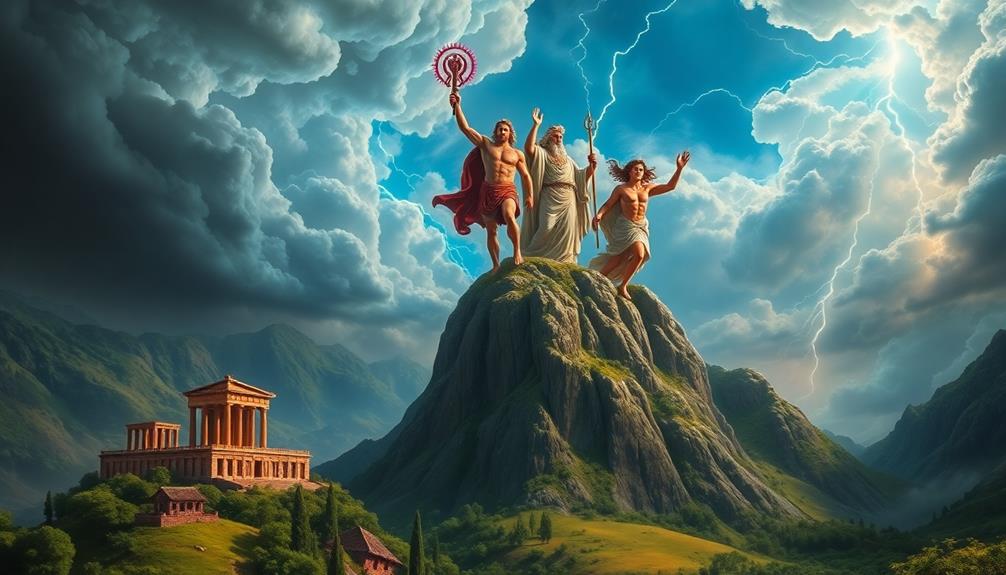
Influencing every aspect of human life, the Greek gods play a pivotal role in shaping the myths and stories that define their culture.
These gods and goddesses, residing on Mount Olympus, interact with mortals, reflecting human emotions and traits. Their influence is profound, guiding decisions and shaping destinies.
Here are some key aspects of their impact:
- Zeus: As the king of the gods, he embodies authority and justice, often intervening in human affairs to maintain order.
- Hera: Representing marriage, she illustrates the complexities of jealousy and revenge, especially regarding Zeus's numerous lovers.
- Athena: The goddess of wisdom and warfare, she provides strategic guidance to heroes like Odysseus, influencing their quests through her insights.
- Poseidon: Ruler of the sea, he reflects the ocean's unpredictability, affecting sailors and coastal communities with his volatile temperament.
In Ancient Greece, these divine interactions not only entertained but also instilled moral lessons, teaching mortals about virtues, consequences, and the human condition.
The myths encapsulate the profound connection between gods and humans, shaping cultural identity and values.
Symbolism in Mythological Stories
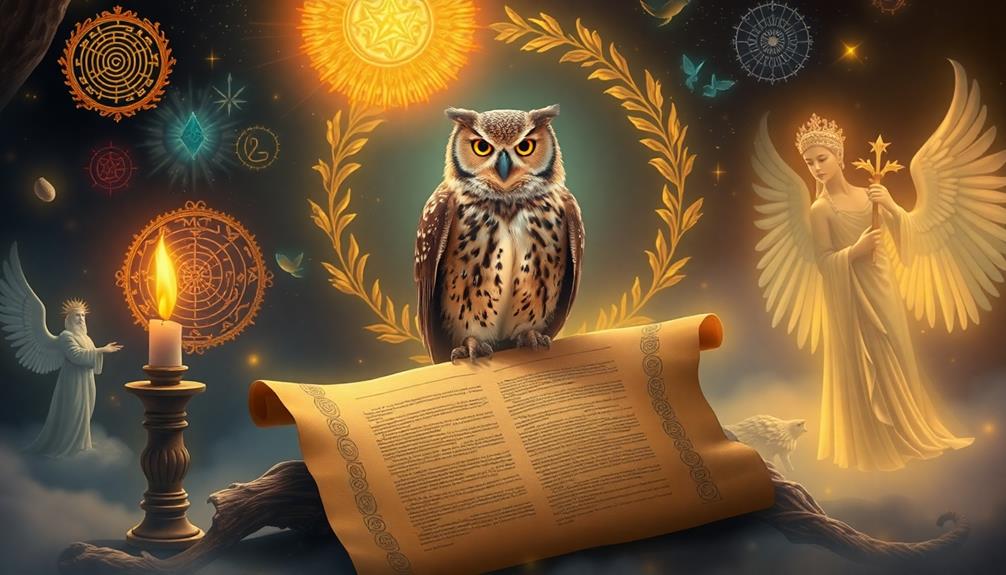
Greek myths are rich with symbolism, often using vivid imagery to convey profound moral lessons. These stories reflect essential truths about human life, revealing how our actions and choices lead to consequences that shape our existence. The symbolism in these myths serves as an important part of their narratives, guiding you to deeper understandings.
| Myth | Symbolism | Moral Lesson |
|---|---|---|
| Pandora's Box | Dangers of curiosity | Hope exists even amidst suffering |
| The Minotaur | Chaos vs. civilization | Struggle with inner demons |
| Icarus's Flight | Ambition and hubris | Importance of moderation |
For instance, Pandora's Box illustrates how curiosity can lead to unforeseen troubles, while the Minotaur represents the eternal battle between order and chaos within us. Icarus's flight serves as a cautionary tale about the consequences of overreaching ambition. Each myth encapsulates the trials you face in life, reminding you that personal growth and perseverance are key to overcoming challenges. By exploring these symbols, you gain insights into the complexities of human nature and the moral dilemmas we encounter.
Lessons From Tragedy

Stories of Greek mythology often reveal profound truths about the human experience, particularly through their tragic narratives. These tales teach us important lessons about our flaws and the consequences that follow. Here are some key takeaways:
- Futility of Trying to Escape Fate: Oedipus's story shows how attempts to avoid destiny can ironically lead to its fulfillment.
- Tragic Consequences of Greed: King Midas learns too late that his wish for everything to turn to gold isolates him in despair.
- Dangers of Hubris and Disobedience: Icarus's fall serves as a stark reminder that overambition and ignoring warnings can lead to dire outcomes.
- Impact of Temptation and Doubt: Orpheus's failure to trust Hades's conditions results in the permanent loss of Eurydice, showcasing the ruinous effects of doubt.
These myths illustrate that human flaws often lead to tragic ends. They remind you that your choices and actions carry weight.
The Power of Hope

In the depths of despair, hope emerges as a powerful force that can uplift the human spirit. In the myth of Pandora's Box, hope is the last entity to escape, symbolizing resilience even after chaos and suffering fill the world. This reflects the essence of transformative life changes, as it shows that even small adjustments in perspective can lead to greater strength and determination.
Despite the evils released, you can see hope shining through, reminding you that better times can follow even the darkest moments.
Consider Orpheus, whose love for Eurydice drives him to descend into the Underworld. Armed with nothing but his music and an unwavering belief in reuniting with her, he embodies how hope can fuel strength in the face of overwhelming challenges.
This myth highlights that hope isn't just a passive emotion; it's an active force that propels you to seek solutions and work for a brighter future.
Throughout Greek mythology, hope plays an essential role in illustrating the human spirit's ability to cope with adversity. Heroes and mortals alike encounter trials, yet they persist through their faith in eventual triumph.
In every tale, the presence of hope reminds you that even amidst chaos, you can find the resilience to continue and aim for healing, redemption, and a better tomorrow.
Transformation and Redemption

Transformation and redemption are central themes in many myths, illustrating how characters evolve through their experiences. In the world of Greek myths and legends, you'll find powerful stories that emphasize these concepts, showcasing the consequences of pride, love, and fate.
Here are four notable examples:
- Arachne's Transformation: When Arachne challenged the goddess Athena, her pride led to her transformation into a spider, teaching the importance of humility and respect for divine power.
- Persephone's Journey: Her descent into the Underworld signifies the seasonal cycle of death and rebirth, representing humanity's connection to nature and the transformative power of renewal.
- Daphne's Metamorphosis: Escaping unwanted advances, Daphne transformed into a laurel tree, achieving redemption while preserving her identity and autonomy.
- Eros and Psyche: Their love story highlights transformation through trials, where Psyche's perseverance leads to redemption and growth in trust.
These myths remind you that transformation often comes with challenges, but through these experiences, characters find paths to redemption, revealing deeper truths about life and the human experience.
Legacy in Modern Culture
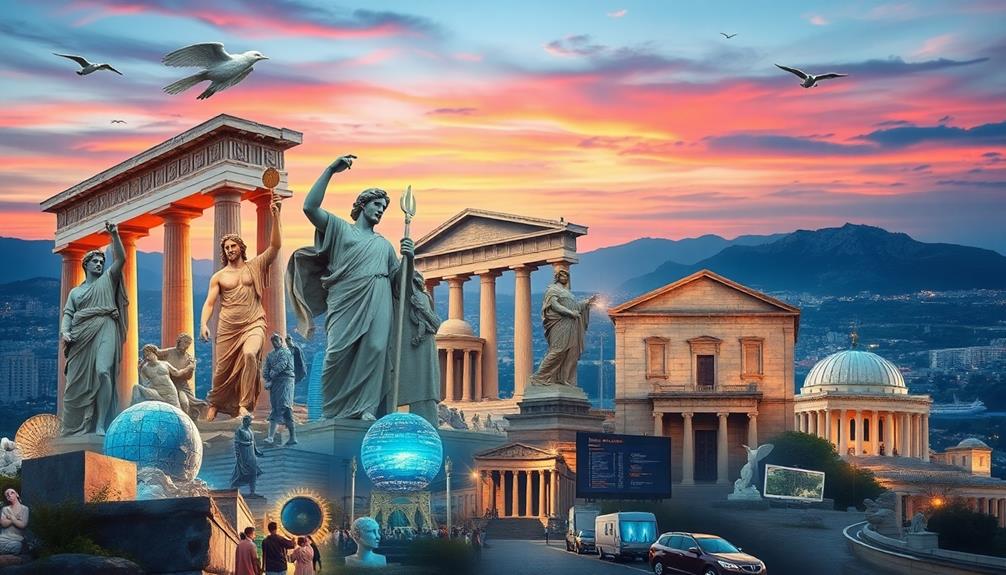
Greek myths continue to shape modern culture, especially in literature and art.
You can see their influence in popular series like "Percy Jackson," where ancient tales meet today's adventures, and in countless artworks that celebrate these timeless stories.
This enduring legacy highlights how these ancient narratives still resonate with us, inspiring creativity and reflection.
Mythological References in Literature
Countless modern literary works draw inspiration from the rich tapestry of Greek mythology, weaving ancient tales into narratives that resonate with today's audiences.
You'll find that these myths and stories of gods often explore universal themes that still hold relevance. Here are four significant ways Greek mythology influences contemporary literature:
- Character Inspiration: Figures like Achilles and Odysseus inspire modern characters, embodying themes of heroism and loyalty.
- Exploration of Hubris: The concept of hubris, prevalent in Greek myths, appears in works like Mary Shelley's "Frankenstein," showcasing the consequences of pride.
- Tragic Love Stories: The tragic love story of Orpheus and Eurydice serves as a powerful metaphor for loss and longing, influencing poetry and drama alike.
- Symbolism and Archetypes: Greek mythology's rich symbolism and complex characters shape literary tropes, making them foundational in storytelling traditions worldwide.
Influence on Contemporary Art
Art today is deeply enriched by the legacies of ancient mythology, with numerous artists drawing inspiration from these timeless tales. The influence of Greek myths permeates contemporary art, evident in various forms, from Renaissance paintings to modern films. Artists like Botticelli, with *The Birth of Venus*, and Ingres, in *The Apotheosis of Homer*, exemplify how the gods and their stories continue to resonate.
| Art Form | Example |
|---|---|
| Renaissance Painting | *The Birth of Venus* |
| Modern Film | *Clash of the Titans* |
| Literature | *Circe* by Madeline Miller |
| Public Installations | Murals depicting Greek heroes |
| Branding | Nike, named after the goddess |
As you explore these connections, you'll see how the narrative structures and character archetypes from Greek mythology shape storytelling across literature, theater, and visual arts. These universal themes of heroism, love, and tragedy remain relevant. Additionally, public art often references these ancient figures, reinforcing their impact on urban culture. Even in consumer culture, names like Nike serve as a reminder of the enduring legacy of Greek mythology.
Frequently Asked Questions
What Is the Most Famous Myth in Greek Mythology?
You might agree that the Trojan War is one of the most famous Greek myths. Its themes of love, betrayal, and cunning tactics resonate deeply, showcasing the complexities and tragedies of human conflict throughout history.
What Is the Biggest Mystery in Greek Mythology?
You might wonder about the biggest mystery in Greek mythology. Is it the true nature of the gods, or perhaps the role of fate in human lives? Each question leads you deeper into ancient enigma.
What Is the Summary of the Greek Myths?
Greek myths weave tales of gods, heroes, and morality, exploring human experiences and virtues. They highlight themes like hubris, temptation, and personal growth, offering timeless lessons that still resonate with your life today.
What Did the Greeks Used Myths to Explain?
The Greeks used myths to explain natural phenomena, human emotions, and cultural values. You'll find these stories provide insights into life's complexities, teaching lessons about ambition, trust, and the balance between hope and suffering.
Conclusion
In exploring the hidden meanings behind Greek myths, you uncover a treasure trove of wisdom that still resonates today. These timeless tales act like a mirror, reflecting the complexities of human nature and the struggles we all face. By embracing the lessons of morality, love, and transformation, you can navigate your own life's journey with greater clarity. Just as the stars guide sailors at sea, these myths illuminate the path to understanding ourselves and our world.
